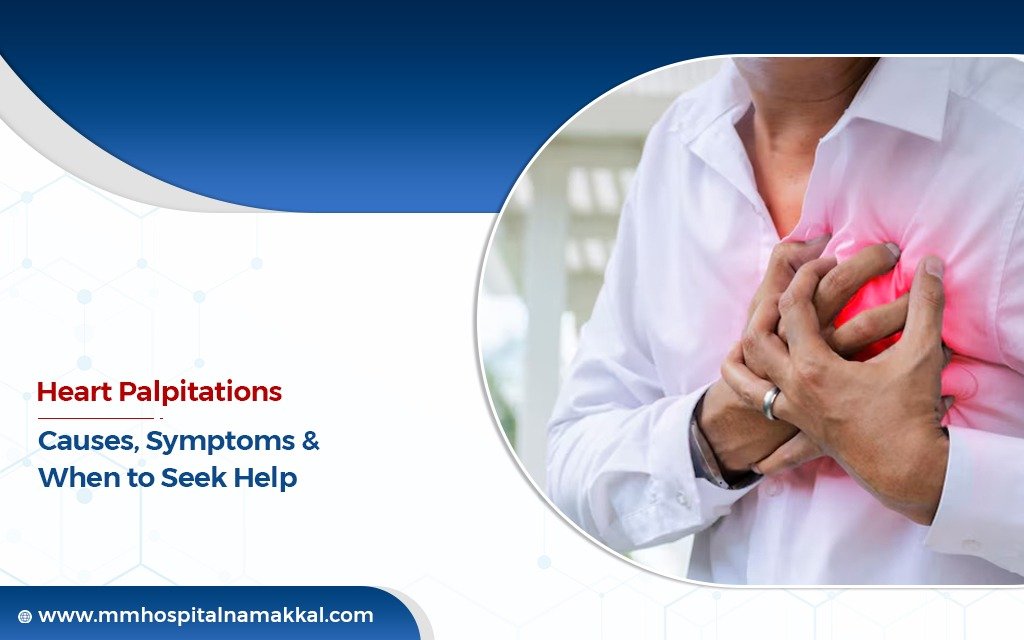
Have you ever felt your heart flutter, race, or pound suddenly—especially when you’re just sitting or lying down? That strange sensation is called a Heart Palpitation. While they can be alarming, not all palpitations are dangerous. Still, it’s important to understand when they could signal something more serious.
At MM Hospital, Namakkal, our experienced cardiologists specialize in identifying and treating heart-related concerns. This blog will help you understand:
- What heart palpitations are
- Common causes
- Warning signs
- When to consult a doctor
- How MM Hospital supports your heart health
What are Heart Palpitations?
Heart palpitations are the feeling that your heart is:
- Beating too fast (racing)
- Skipping a beat
- Fluttering or pounding unusually
You may feel them in your chest, throat, or neck. Sometimes, they come and go quickly. At other times, they last longer and may be accompanied by other symptoms.
Palpitations are not always a sign of heart disease, but when frequent or intense, they may require medical attention—especially if you have a history of heart problems.
What Causes Heart Palpitations?
Heart Palpitations can have many triggers—ranging from everyday habits to medical conditions. Here are some of the most common causes:
1. Stress and Anxiety
Strong emotions like fear, nervousness, or panic can increase adrenaline levels, causing your heart to race. People with anxiety disorders may experience frequent palpitations during episodes.
2. Caffeine and Stimulants
Beverages like coffee, tea, energy drinks, or even some sodas contain caffeine, which can cause the heart to beat faster. Over-the-counter decongestants, some cough syrups or weight-loss pills may also lead to palpitations.
3. Physical Activity
Exercise naturally increases your heart rate. But if you feel like your heart is pounding unusually even after light activity—or you feel dizzy or faint—it may be worth checking.
4. Smoking and Alcohol
Nicotine and alcohol can overstimulate the heart and lead to irregular rhythms, especially when consumed in large amounts.
5. Hormonal Changes
Women may experience palpitations during pregnancy, menstruation, or menopause due to hormonal fluctuations.
6. Thyroid Problems
An overactive thyroid (hyperthyroidism) produces hormones that increase your heart rate and may cause fluttering sensations.
7. Heart Conditions
Sometimes, palpitations are a sign of a heart problem such as:
- Arrhythmias (irregular heartbeat)
- Atrial fibrillation
- Heart valve disorders
- Previous heart attack or heart failure
Symptoms to Watch Out For
Palpitations alone may not be serious. However, if you experience the following symptoms along with palpitations, you should seek immediate medical care:
- Chest pain or tightness(compression)
- Shortness of breath
- Dizziness or fainting
- Unexplained fatigue
- A fast or irregular heartbeat that lasts more than a few minutes
If you have a history of Heart Disease, these symptoms should never be ignored. Early diagnosis can make a big difference.
When Should You See a Doctor?
You should consult a Best Heart Specialist Hospital In Karur, Namakkal at MM Hospital if:
- Your palpitations are becoming more frequent
- They occur without a clear reason (like caffeine or exercise)
- You feel weak, breathless, or dizzy during an episode
- You have existing heart or thyroid conditions
- You’re concerned or anxious about your heart health
At MM Hospital, we offer timely evaluation and accurate diagnosis to give you peace of mind and protect your heart.
How Are Heart Palpitations Diagnosed?
At MM Hospital, Namakkal, we use a combination of clinical assessment and advanced tests to understand the cause of palpitations.
Diagnostic Tests May Include:
- Electrocardiogram (ECG): A quick test that records your heart’s electrical signals to detect abnormal rhythms.
- Holter Monitor: A wearable device that records your heartbeat continuously for 24–48 hours.
- Echocardiogram (Echo): An ultrasound scan to visualize the heart’s structure and check for valve or chamber problems.
- Blood Tests: These help check for thyroid issues, anemia, electrolyte imbalance, and other triggers.
Your doctor may also ask about your lifestyle, stress levels, medications, and sleep quality to identify non-cardiac causes.
Treatment Options for Heart Palpitations
Treatment depends on the cause and the severity of your symptoms. At MM Hospital, our expert cardiologists personalize your care to ensure long-term heart health.
1. Lifestyle Changes
Many palpitations are caused by habits or temporary stress. Some helpful steps include:
- Limiting caffeine and alcohol
- Quitting smoking
- Reducing stress through yoga, meditation, or deep breathing
- Improving sleep patterns
- Staying hydrated
2. Medications
If palpitations are caused by arrhythmias, thyroid imbalance, or blood pressure issues, medications may be prescribed to regulate your heart rhythm and treat the root cause.
3. Treating Heart Conditions
If a serious heart issue is detected, we may recommend:
- Anti-arrhythmic drugs
- Cardiac ablation – a procedure to correct irregular heart rhythms
- Pacemaker or defibrillator – in rare cases
- Regular follow-up with our cardiology team
Heart Care at MM Hospital, Namakkal
At MM Hospital, we pride ourselves on being one of the Best Cardiology Hospitals in Namakkal. We are equipped to manage everything from common palpitations to complex heart conditions.
Why Patients Trust Us:
- Skilled Cardiologists in Namakkal
- State-of-the-art heart care technology
- 24×7 Emergency Cardiac Services
- Compassionate, patient-first approach
- Complete care under one roof – from diagnosis to treatment
Whether your palpitations are due to stress or a deeper condition, our team ensures you receive the best care and clarity.
Final Thoughts
Heart Palpitations are a common experience. While many are harmless, they can sometimes point to serious health conditions. Listen to your body. If you feel something is off, don’t wait.
At MM Hospital, Namakkal, we’re here to help you understand your heart and keep it healthy. Early care, right advice, and regular follow-up can make all the difference.


